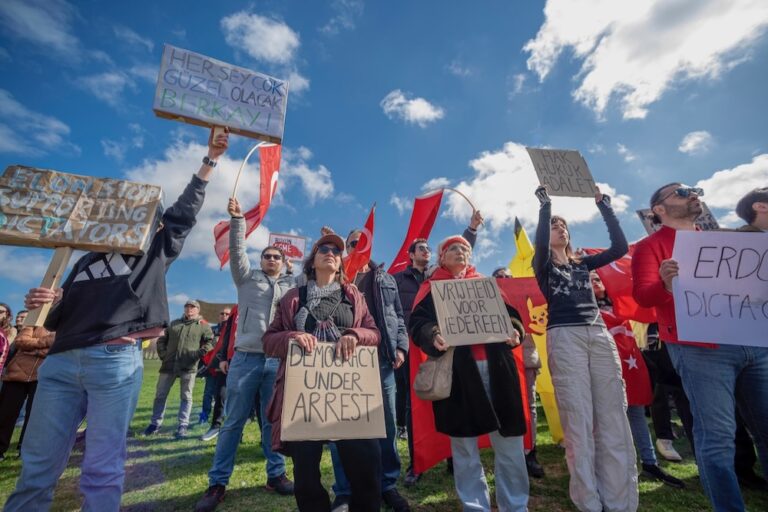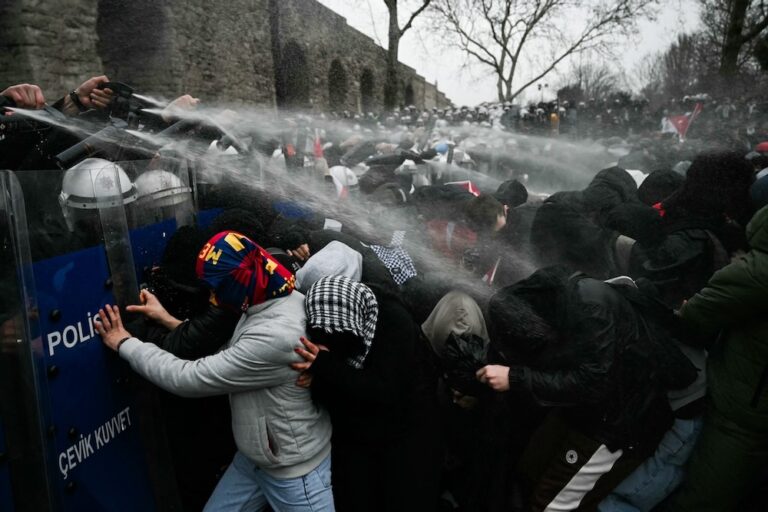(RSF/IFEX) – In a letter to Turkish Prime Minister Bulent Ecevit, RSF expressed concern over the upcoming vote in parliament on an amendment of the law on the Turkish broadcasting authority (RTÜK), which includes new restrictive clauses. “The vote on these new clauses is a clear step towards reinforcing the government’s control of media outlets,” […]
(RSF/IFEX) – In a letter to Turkish Prime Minister Bulent Ecevit, RSF expressed concern over the upcoming vote in parliament on an amendment of the law on the Turkish broadcasting authority (RTÜK), which includes new restrictive clauses.
“The vote on these new clauses is a clear step towards reinforcing the government’s control of media outlets,” stated Robert Ménard, the organisation’s secretary-general. “We ask that you make a personal intervention so that the proposed measures are not adopted before a more thorough review of the motivations for the proposed legislation can take place,” added Ménard in his letter to the government leader. RSF also protested the many penalties announced against electronic media.
According to information collected by RSF, the bill, which is scheduled to be examined this week in order to amend the law governing the RTÜK, was first introduced one year ago, but was abandoned at the time. The bill was recently reintroduced and adopted by parliament’s Constitutional Commission on 17 May 2001, before being submitted for a vote by members of parliament.
The bill represents the first attempt to reform the RTÜK’s operations since its creation in April 1994 (Law 3984). It includes provisions which are further detrimental to freedom of information in Turkey:
– membership in the RTÜK (which until now included five government and four opposition representatives) is to be modified to further increase the government’s majority position. From now on, the High Council on Education (YÖK), which is under state control, is to be represented, as well as the National Security Council (MGK), whose chair is the head of state, and whose other members include high military officials, the prime minister and members of the government. The new representation is to include five persons elected by parliament and four appointed by the council of ministers, including two persons selected from the YÖK’s list of recommended candidates, one from the MGK’s list, and one from lists of the Association of Turkish Journalists (TGC) and the Press Council. Representation on the RTÜK from the two major press organisations is unlikely to provide a counterweight to this increased representation by government supporters.
– the RTÜK’s responsibilities are to be modified. The bill reinforces the authority’s role as a genuine media police. The RTÜK is to have an increased number of enforceable penalties available in its decisions against radio and television stations, including warnings, fines, censorship of certain programmes and the outright suspension of media outlets. The fines for infractions are increased by 1000 percent, on average, which is well above the inflation rate. Managers of media outlets who continue to broadcast despite bans by the RTÜK are to receive prison sentences ranging from six months to two years and heavy fines. “Insult” and “defamation” are to be penalised by a minimum fine of 10 billion lira (approx. US$9,000; 10,000 euros). The management of frequencies is to be placed under a single authority, the Telecommunications Council.
– The RTÜK’s authority is to include control of the Internet for the first time, including the control of information portals on the network. Insults circulated via e-mail are punishable by penalties under criminal law.
Finally, many observers have indicated that the measures included in the bill which cover property laws for media may increase media ownership concentration in Turkey.
The bill imposing new restrictive clauses to audio-visual legislation comes at a difficult time for press freedom in Turkey. The number of sentences imposed by the RTÜK remains very high (radio and television programmes were suspended for a total of 4,500 days in 2000). During the RTÜK’s last meeting on 16 May, nine local radio stations and four television stations had their programmes suspended for a total of 392 days. Five journalists are currently imprisoned in Turkey for having voiced their opinions or exercising their profession. They include Asiye Zeybek Güzel, Nureddin Sirin, Hasan Özgün, Kemal Evcimen and Mustafa Benli. Three of them were sentenced to prison terms ranging from 12 years and six months to 17 years and six months for “membership in an illegal organisation”. The two others still await trial.


